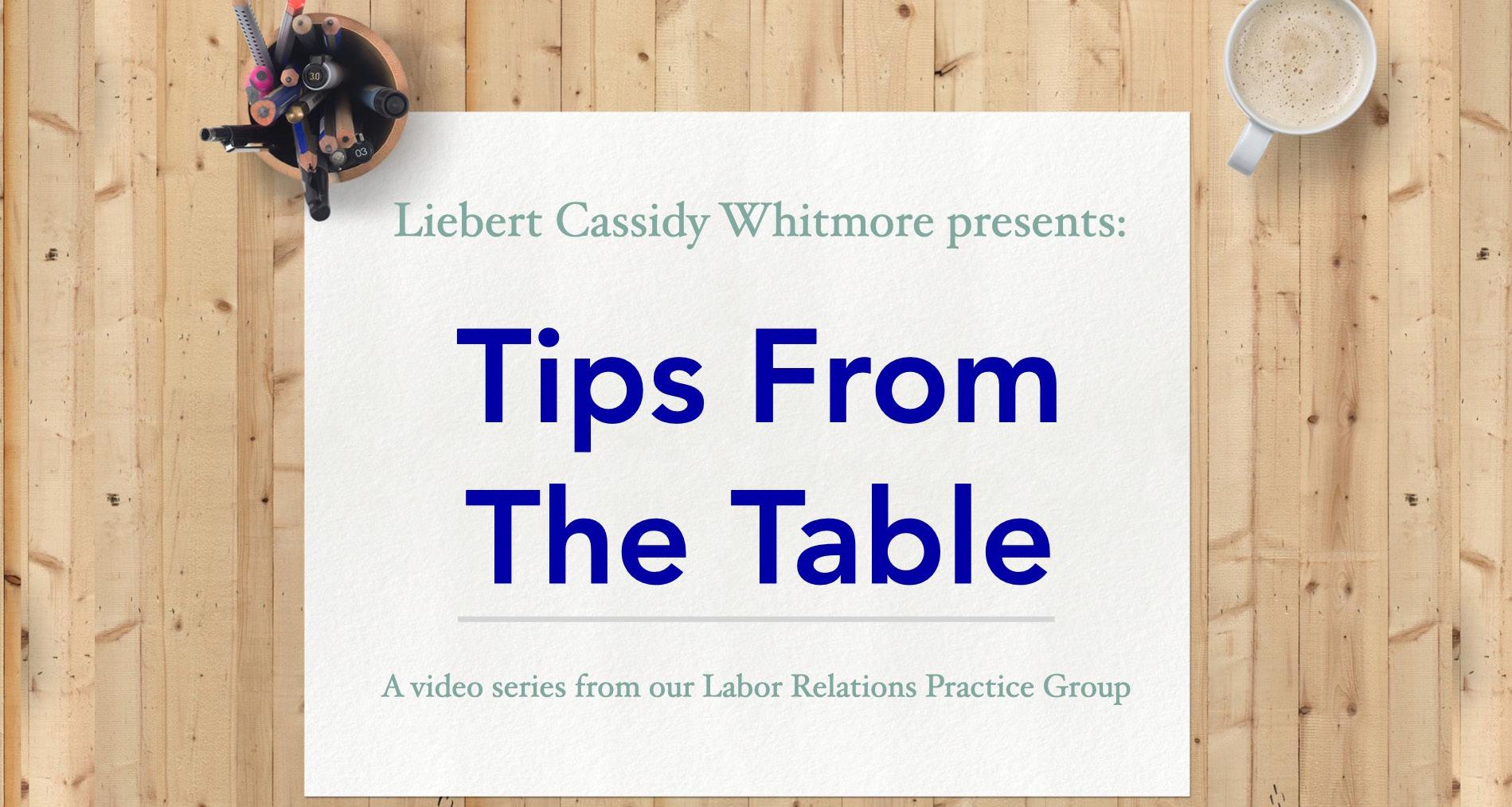Briefing Room











LCW Partners Jennifer Rosner and Joung Yim and Associates Marek Pienkos and Cara Strike succeeded on a City’s motion for summary judgment against a fire captain.
A City fire captain voluntarily participated in the unpaid Search and Rescue program. His lawsuit claimed that after he reported that the fire chief and battalion chief had allegedly misused funds, the City “demoted him” from Search and Rescue Coordinator to Search and Rescue Program Advisor, and that his Coordinator position was given to a much younger person. He also alleged he received a substandard performance evaluation.
LCW convinced the court that the City had not taken any adverse employment action, and therefore the fire captain’s claims for retaliation and discrimination lacked merit. First, the position he was allegedly “demoted” from was a voluntary, unpaid position and had no bearing on his actual employment, salary, or benefits. Second, the fire captain did not receive a substandard performance rating. He had been rated as “Standard” in all but three categories, in which he was rated “Above Standard.” LCW further showed that a rating of “Standard” meant “meeting or exceeding expectations” and these ratings were consistent with the fire captain’s performance evaluations from the prior 10 years.
The court rejected the fire captain’s speculative argument that the “demotion” damaged his reputation and would result in future earnings loss. Because the fire captain offered no evidence to support this speculation, the court found no reasonable trier of fact could find that his future career prospects had been affected.
Therefore, the court dismissed all claims.
To view these articles and the most recent attorney-authored articles, please visit: www.lcwlegal.com/news

• Recently published in Law360, LCW Partner Paul Knothe and attorney Morgan Johnson discuss the transition of POST from a voluntary incentive program to a requirement and the surrounding circumstances that pushed these changes to be enacted.
• Recently published in Benefits Magazine, LCW Senior Counsel Stephanie Lowe writes about the types of paid and unpaid leave options that employees may use to cover parental leave and discusses how employers may help employees understand and access these options.
• LCW Partner Shelline Bennett discussed AB 2188, which prevents employers from penalizing or firing an employee who uses marijuana on their own time. “The current drug testing that employers use are primarily drug tests that test for non-psychoactive cannabis metabolites,” Bennett said, adding that the current drug tests most employers have are prohibited by this law. “You have to be able to test for current impairment- THC and that's still being fine-tuned by the pharmaceutical companies."
• Recently published in the California Special Districts Association March/April magazine, LCW Partner Elizabeth Arce and Senior Counsel Stephanie Lowe write on the pros and cons of a 9/80 work schedule. “The 9/80 is a two workweek schedule of eight 9-hour days, one 8-hour day, and one day off” Arce and Lowe state. “While the 9/80 has its benefits, there are also a number of pitfalls that can inadvertently trigger overtime liability.”
Hanin Atalla and Erik Lund met in fall of 2017, when Atalla shadowed Lund at Rite Aid during her pharmacy school rotations. When Atalla’s rotation at Rite Aid ended, she attended a celebratory dinner with Lund and his wife and the two kept in touch. Atalla later began work at Rite Aid as a graduate intern and then hourly staff pharmacist; Lund was her supervisor. Atalla and Lund became close friends, celebrated a Friendsgiving, joked regularly, and frequently went to lunch. They texted on their personal cell phones about a range of personal matters, including travel and vacations, exercise, food, weight loss, restaurants and getting together for meals, family and relatives, birthdays, fashion, drinking and alcohol, work issues, their respective spouses, pets, and social media. They also dined together as couples with their spouses, including once for Atalla’s birthday.
Approximately one month after Atalla’s birthday, while Atalla was at home and Lund was at a hotel for personal business, Lund began texting Atalla on their personal cell phones about the alcohol he was preparing to drink at the hotel. Shortly thereafter, Lund texted her a “Live Photo” of him masturbating, followed by a text that said, “I am so drunk right now.” He then texted, “Meant to send to wifey”, to which Atalla responded, “It’s ok, I deleted it before I end up in a divorce.” Lund then sent several more texts stating, “Both of us” and “Race to the bottom” accompanied by a photo of his penis. Atalla texted, “Erik, stop please,” to which he replied, “You are right.” The exchange ended.
Rite Aid promptly fired Lund and Atalla said she would not be returning to work. She filed a claim for violation of the Fair Employment and Housing Act (FEHA) for sexual harassment, failure to prevent sexual harassment, and hostile work environment, among other things. The trial court granted Rite Aid’s motion for summary judgment, and Atalla appealed.
The California Court of Appeal affirmed the trial court because Atalla had not raised a triable issue of material fact that Lund was acting in the capacity of a supervisor in during the text exchange. Rather, the Court agreed with the trial court and Rite Aid that Lund and Atalla had an extensive texting relationship that predated her employment, the exchange occurred outside the workplace and outside of work hours, and the exchange arose from their friendship (yet also ended it). Moreover, Atalla admitted that she and Lund were friends before she worked at Rite Aid and their friendship was not connected to her work at Rite Aid.
Because Atalla could not make the fundamental showing that Lund was acting in a supervisorial capacity, the Court affirmed the trial court’s ruling and dismissed the case against.
Atalla v. Rite Aid, 2023 WL 2521909 (Cal. Ct. Appeal).
Note:
Texting and drinking do not mix. This supervisor lost both his job and a friend. In addition, he could have been personally liable for damages had he been texting in his capacity as a supervisor.
The following received their certificates at the LCW Conference earlier this month:

Nicholle Collins
Dawud Brewer
Omar Castro
Karen Gish
Monique Goetz
Cora Hall
Carrie Hanes
Emily Milne
Hayley Schwartzkopf
Miguel Serna
Jennifer Sommers
JoAnn Weberg
Denise Gonzalez
Cherie Johnson
In June 1999 Kaiser Foundation Hospitals hired Suchin Lin as a data management associate. From 1999 to 2016, Lin was promoted or transferred several times and consistently received positive performance evaluations. In May 2017, Lin was transferred to another position. She received an overall rating of “successful performance” in her first year in that position. This was the same overall rating as her four, more experienced teammates in the same department. Later in 2018, Lin again received a positive performance evaluation. But Lin was placed on a lay-off list in December 2018, along with 30 others.
On January 7, 2019, Lin fell in her workplace and injured her left shoulder. That same day, a doctor placed Lin on modified duty through January 11. This modified duty was later extended through March 25. On January 19, 2019, Lin’s supervisor Sridhar Manne discussed Lin’s performance with human resources and specifically discussed that Lin’s slower performance was possibly due to modified duty.
While Lin was dealing with her injury, Manne, his supervisor Douglas Monroe, and department head Wilson Henriquez were attempting to figure out who to lay off. In Janaury 2019 Henriquez asked Manne to rate his five employees on a scale of one to four in five different categories. Manne gave Lin a cumulative score of nine out of 20. The rest of Lin’s teammates received a score of 16 or above.
In February 2019, Manne met with Lin to discuss her performance. Manne stated that Lin’s “unavailability” had forced her teammates to complete her tasks and that Lin needed to work faster in light of her absences due to physical therapy appointments. He also pressured her to work unpaid overtime. Soon thereafter, Lin was placed on medical
leave through May 19. On April 24, Lin was notified that she would be laid off effective June 23, along with 16 other employees. Lin promptly sued Kaiser for disability discrimination.
Courts review Fair Employment and Housing Act (FEHA) disability discrimination claims under the McDonnell Douglas test. This test requires that the employee establish a prima facie case of discrimination: 1) the employee was a member of a protected class; 2) she was performing competently in the position she held; 3) the employer took an adverse employment action such as termination; and 4) some other circumstance suggests the employer acted on a discriminatory motive. The burden then shifts to the employer to produce admissible evidence of one or more legitimate, nondiscriminatory reasons for its adverse employment action. Finally, the burden shifts back to the employee “to attack the employer’s proffered reasons as pretexts for discrimination, or to offer any other evidence of discriminatory motive.”
Kaiser moved for summary judgment and focused on its burden to show legitimate, non-discriminatory reasons for the layoff. Kaiser claimed that because Henriquez had made the decision to eliminate Lin’s position in December 2018, before Lin became disabled, there was no discriminatory animus. Lin opposed this motion by alleging that the initial decision to lay her off was not a final decision, as evidenced by the fact that the lay off list was gradually reduced from 31 employees to 17. She also argued that her ultimate termination was a result of Manne’s ratings, which only became negative after her disability and her request for accommodations.
The trial court agreed with Kaiser, and granted summary judgment. Lin appealed to the California Court of Appeal. The appellate court examined whether: 1) Kaiser’s December 2018 selection of Lin for the layoff list was tentative, or final; and 2) Kaiser’s ultimate decision to keep Lin on the layoff list and to terminate her employment was based, at least in substantial part, on Lin’s disability.
The Court of Appeal found that Kaiser’s initial list was tentative because of its changing nature. In addition, despite that Henriquez did not display any discriminatory animus, he relied upon Manne’s evaluations, which did carry discriminatory animus as shown by Manne’s conversation with human resources and the timing of the negative evaluations. The Court concluded that a reasonable jury could find that the negative evaluations Lin had received and her ultimate termination were substantially motivated by her disability. The Court of Appeal overturned the grant of summary judgment and allowed the case to go to trial.

Lin v. Kaiser Foundation Hospitals, 88 Cal.App.5th 712 (2023).

Note:
This case illustrates: 1) how a supervisor’s resentment toward an employee’s need for accommodation provided evidence of disability discrimination; and 2) that a higher-level manager must ensure a lower-level manager’s evaluations are legitimate and non-discriminatory in making a layoff decision. All supervisors must be trained that the law requires good faith in both the disability accommodation process and in the implementation of accommodations.

Jenai Howard, an associate in the San Francisco office, advises clients on education, labor and employment matters. Prior to joining LCW, Jenai worked as a Research Assistant for two Professors at Santa Clara University School of Law where she conducted various kinds of legal research and co-authored a Criminal Law casebook.
Kimberly Horiuchi, an associate in the Sacramento office, works primarily in the Firm’s Litigation practice group where she represents clients in employment litigation matters. She also focuses on providing trusted advice and counsel to organizations throughout the State and has extensive experience in conducting workplace investigations.

Lindsey Buero worked in an Amazon warehouse. The warehouse had a secured area that contained merchandise. As a theft-prevention measure, employees had to undergo a security screening before exiting this area. Buero filed a class action against Amazon alleging that its failure to compensate employees for time spent waiting for and passing through the security screenings before and after work shifts and breaks violated Oregon’s wage and hour laws.
Amazon argued that this practice did not violate Oregon’s wage laws, which mirrored the Fair Labor Standards Act (FLSA) on the definition of “compensable” work time. Under the FLSA, travel to and from the place of work, and activities which are preliminary or postliminary to the principal work that occurs before or after the workday, are not compensable work time. The only exceptions are: if the activities are either an integral and indispensable part of the employees’ principal activities; or compensable as a matter
of contract, custom, or practice. Amazon argued that Oregon’s wage laws fell squarely under these same federal rules. The Oregon Supreme Court agreed with Amazon that the time was not compensable. Buero then appealed to the Ninth District Court of Appeals.
The Ninth Court affirmed the Oregon Supreme Court. The Supreme Court had analyzed the legislative history of Oregon’s various wage laws and determined that the legislators often based their decisions on the corresponding federal laws. For example, when the legislature defined “Hours Worked”, it explicitly mirrored the FLSA language noted above. Based on that foundation, the Court found that Buero had not shown that passing through the mandatory security screenings fell under one of the enumerated exceptions, and therefore the time was not compensable.
Buero v. Amazon.com Services, 61 F.4th 1031 (9th Cir. 2023).
Nor-Cal Venture Group, Inc. (NorCal) operates fast food restaurants in the Sacramento area. In 2017, a former employee accused Nor-Cal of wrongfully denying overtime pay. As part of the investigation into those allegations, a deputy of the California Labor Commissioner issued subpoenas to Nor-Cal seeking business records. Nor-Cal produced the relevant documents, and the deputy labor commissioner ultimately issued a wage citation for unpaid overtime wages and $900,000 in penalties. Nor-Cal requested an “informal hearing” to contest the citation.
Prior to the informal hearing, the Labor Commissioner issued a deposition subpoena to Nor-Cal’s “Person Most Knowledgeable” on multiple topics related to the issues at the informal hearing. Nor-Cal, however, argued the deposition subpoena was improper. The hearing officer granted the Commissioner’s request to postpone the informal hearing to allow the parties to litigate
the validity of the deposition subpoena, and issued a petition to compel Nor-Cal to comply with the subpoena. Nor-Cal opposed, arguing that it was an improper use of the Commissioner’s investigatory power because the investigation into Nor-Cal’s business practices ended, and a wage citation had already been issued. The trial court ruled in the Commissioner’s favor, and Nor-Cal appealed.
The California Court of Appeal reversed. The law does not grant the Commissioner the power to issue deposition subpoenas for an informal hearing. Instead, the statute explicitly limits subpoena power for informal hearings to documents only. The Court remanded the case with instructions to deny the Commissioner’s petition to compel a deposition.
Garcia-Brower v. Nor-Cal Venture Group, 2023 WL 2421824 (Cal. Court of Appeal).
Liebert Cassidy Whitmore's public safety experts understand the unique challenges, both legal and societal, that law enforcement agencies face, and we use that understanding when handling or advising on the entire scope of personnel issues that law enforcement executives will encounter, from recruiting and hiring through separation and retirement of both sworn and civilian personnel. LCW attorneys not only provide advice, counseling and representation services, but we also train agency personnel on a host of subjects. See below for all of our upcoming public safety seminars!
The New Landscape: 2023 Peace Officer Employment
Central California: April 21, 2023 | Fresno, CA
Southern California: September 6, 2023 | Buena Park, CA

Northern California: May 23 & 24, 2023 | San Ramon, CA
Southern California: October 25 & 26, 2023 | Buena Park, CA
Southern California: August 2, 2023 | Buena Park, CA
Visit


This three-hour presentation is designed to provide an overview of what it means to be a public employee, the important role of a public servant and how to succeed in public service. The presentation will cover the following issues:
• The difference between public vs. private sector employment
• The responsibilities and role of a public employee
• Common labor laws for public employees
• Ethical obligations of public servants
• Efficient use of public resources
• Providing customer service
• Creating and maintaining a work environment of respect, dignity, and integrity for the citizens we serve
Any and all public employees, including entry-level employees, general and lead workers, supervisors and managers. This workshop is also encouraged for any level of employee who is new to the public sector or who would benefit from a refresher workshop.
For more information, visit our website here!
• Through a new program called, Lights On!, police officers in San Diego, Chula Vista, and National City will issue vouchers instead of citations to individuals with broken vehicle lights. The program aims to increase positive encounters between police officers and the community.
• The statewide ban on the use of facial recognition on body cam footage has expired, and California policymakers are considering new bills that would limit police use of biometric surveillance systems.

◦ Proposed bill AB 642 would allow police use of biometric surveillance provided the use meets certain national standards. However, the bill would limit the use of such technology as an investigative aid and would prevent a “biometric match” from being the sole basis for probable cause in an arrest.
◦ Proposed bill AB 1034 would imitate the original state ban by preventing law enforcement from installing, activating or using biometric surveillance “in connection with an officer camera or data collected by an officer camera.”

• The Los Angeles Police Department may be adding a robotic member to their K9 unit. The robot, nicknamed Spot, is built by Boston Dynamics and would come as a gift from the Los Angeles Police Foundation.
For more information on some of our upcoming events and trainings, click on the icons below:


Whether you are looking to impress your colleagues or just want to learn more about the law, LCW has your back! Use and share these fun legal facts about various topics in public safety.

LCW has 30+ consortiums across the State! Consortium members enjoy access to quality training throughout the year, discounts on other LCW products and events, and unlimited, complimentary telephone consultation with an LCW attorney on matters relating to employment and labor law questions (including questions involving COVID-19, supervisory skills, and negotiation matters!). We’ve outlined a recent consortium call and the provided answer below. Client confidentiality is paramount to us; we change and omit details in the ERC Call of the Month.

A police officer receives assignment pay for FTO duties. The officer is injured and on light duty. The City needs to give the assignment to another officer who can perform the duties. Is this a punitive action under Public Safety Officers Procedural Bill of Rights Act (POBR) and subject to due process?
The City can temporarily assign FTO duties to another while the officer is unable to perform the job functions. However, the City cannot take away the officer’s specialty pay for the assignment without due process. Even then, it could be considered retaliation/ discrimination for being injured or filing a worker’s compensation claim, so it would be advisable for the City to continue to pay the officer specialty pay.
 By: Troy Heisman
By: Troy Heisman
The Public Safety Officers Procedural Bill of Rights Act contains a statute of limitations that commences with the discovery of misconduct by public safety officers in the employment setting. According to Government Code Section 3304(d)(1), an agency cannot discipline any officer “for any act, omission, or other allegation or misconduct” unless the agency completes its investigation and notifies the officer of the proposed discipline “within one year of the public agency’s discovery by a person authorized to initiate an investigation of the allegation of an act, omission, or other misconduct.” The Court of Appeal in the Third Appellate District for the State of California recently heard argument regarding how the statute of limitations ought to run for multiple instances of employee misconduct.
Summary of the Facts of the Case of Luis Garcia v. State Department of Developmental Services
Luis Garcia was a police officer for the State Department of Developmental Services starting in 2003. However, in 2018, the Department discovered Garcia had been manipulating his colleagues’ schedules in order to subvert the Department’s policy limitation on overtime accrual. As a result, Garcia received unnecessary overtime and the Office of Law Enforcement Support (OLES) investigated once the Department learned of his conduct. During the course of the investigation, which took place between June 2018 and February 2019, OLES discovered various other acts of misconduct unrelated to the original investigation. These other acts of misconduct occurred in February 2018, May 7, 2018, May 20, 2018, and between June 2017 and June 2018. On April 26, 2019, the Department issued a notice of adverse action, stating Garcia would be terminated effective May 3, 2019. The notice specified that the adverse action was due to Garcia improperly scheduling himself to work overtime, acting unprofessionally, threatening to retaliate against a sergeant, improperly ordering a subordinate to work overtime, and taking photographs of a workplace item for no legitimate reason. Garcia was released from employment on May 3, but the Department subsequently withdrew its adverse action as a result of Garcia’s appeal of the termination.
On September 26, 2019, the Department issued a second notice of adverse action to Garcia announcing an impending demotion effective on October 4, 2019. The notice stated that the adverse action was based on Garcia’s improper scheduling himself to work overtime, acting unprofessionally, improperly ordering a subordinate to work overtime, retaliation, unprofessional behavior, using an offensive slur, using his work computer for non-work purposes, and a plethora of other acts of misconduct. Garcia appealed the decision to the State Personnel Board (SPB) and filed a motion to dismiss the case, arguing the section 3304(d)(1)’s one year limitations period barred the action. He argued that since the Department asked OLES to investigate his overtime misconduct on or around May 24, 2018, the Department must have served its notice of adverse action within one year of that date.
The SPB rejected the argument that in matters of multiple acts of misconduct, the initiation of the investigation into one act triggers the one year limitations period for all acts of misconduct. Following this decision, Garcia filed a writ of mandate to the superior court and the court rejected Garcia’s challenge and entered judgment in the Department’s favor. Garcia appealed to the California Court of Appeal.
The Court reasoned that that language of Section 3304(d)(1) “makes plain that the date of discovery for each act, not the date an investigation is initiated for any one act, is the relevant consideration.” The Court of Appeal also cited case precedent that largely disagrees with Garcia’s argument, stating that the statute of limitations begins to run at the time of the discovery of each act of misconduct.
The Court rejected Garcia’s four separate arguments. First, he argued the statute did not carve out an exception for extending the 12-month statute when investigators discover new material in their investigation. The Court rejected this argument stating its focus is not on the exceptions but the text itself, which is plain and states that the oneyear statute of limitations begins to run from the time the misconduct is discovered. Second, Garcia argued the Department was at fault for not initiating a new investigation each time it discovered a new act of misconduct. He put forth an argument that the text of the statute states that all acts of misconduct during a single investigation are subject to the same limitations period, however, the Court stated that no such requirement appears in the text.
Third, the Court stated that Garcia seemed to assume that because it is difficult for an employee to obtain facts to show an agency acted in an untimely way, that should be enough to state that the agency acted in an untimely manner. The Court disagreed and stated that the employee must prove all facts of the defense to satisfy each of its elements and it is not enough to simply allege the defense. Finally, Garcia relied on a 2018 case Ochoa v. County of Kern arguing that the case shows that the section 3304(d)(1) limitations period for each discovered act of misconduct begins to run once the agency initiates the investigation into any one of the officer’s improper acts. The Court of Appeal disagreed, stating that Ochoa held that “the investigation of the misconduct and requisite notification to the officer must be accomplished within one year of the public agency’s discovery by a person authorized to initiate an investigation.”
The Court did not address any of the Department’s arguments in favor of the Court’s ruling, due to Garcia’s four arguments having failed. As a result, the Court held unequivocally that section 3304(d)(1)’s one year limitations period runs on an act of misconduct from the time it is discovered, regardless of whether the act is discovered as part of an investigation of another act of misconduct.
The employee all but threw the kitchen sink at the Court of Appeal in an attempt to convince the Court to hold that the statute of limitations begins upon the discovery of the first act of misconduct. However, despite these creative attempts, the Court did not budge. This is good news for public agency employers as it does not require employers to adhere to a one year statute of limitations upon the initiation of investigation, regardless of when the misconduct is discovered. As a result, employers can rest easy in the sense that they will not need to expedite procedural due process with respect to misconduct discovered late in the investigation. However, they are also not out of the woods. As mentioned in the case, workplace investigations are complex and it is common that an investigation will uncover unanticipated acts of misconduct.
This will require diligence from both the employer and from the investigator, whether internal or external—as exact dates of discovery will be critical in order to track the statute of limitations in an investigation that discovers multiple acts of misconduct. It would behoove employers to have a discussion with investigators to track discovery of misconduct that is not within the scope of the investigation and to record the date of that discovery. This will allow employers specifically to track each discovery of each act of misconduct, and thus have high accuracy in tracking the statute of limitations.
View the full blog here.

 Liebert Cassidy Whitmore
Liebert Cassidy Whitmore